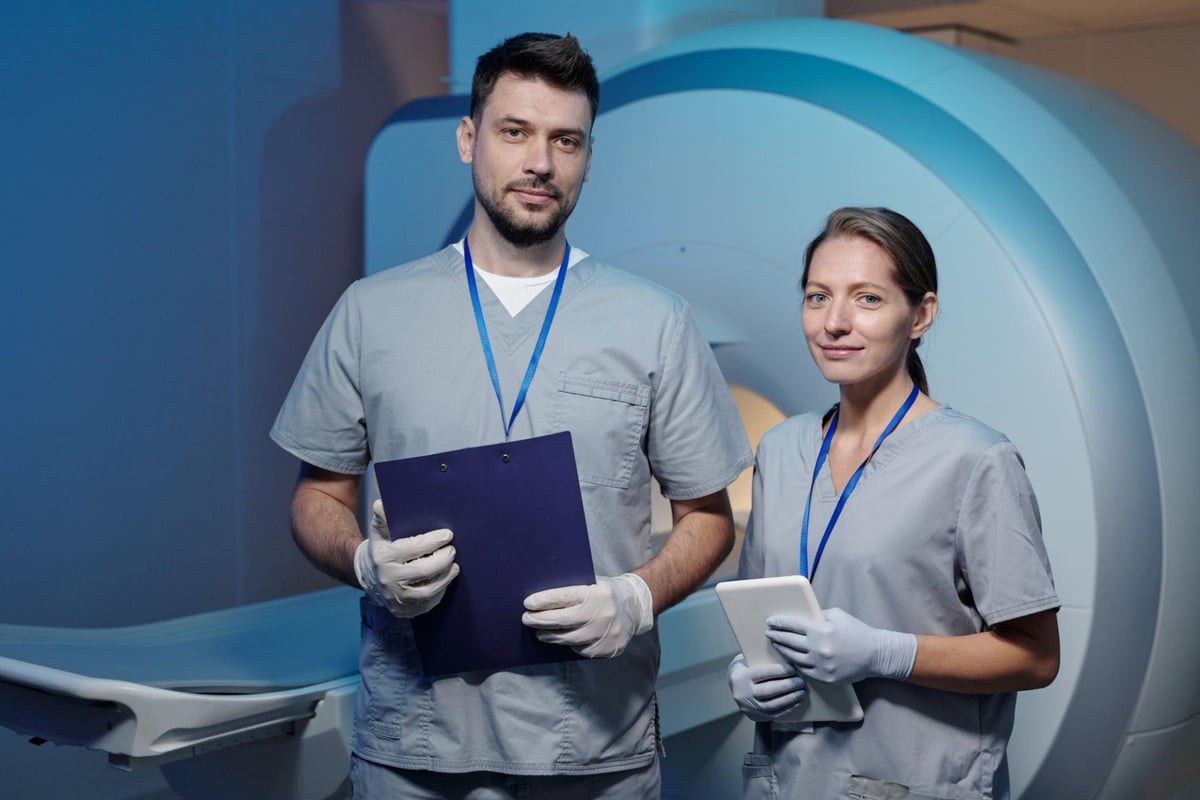Where Can a Radiology Technician Work?

Want personalized recommendations?
Let's match you to the right program

Radiology technicians, also known as radiologic technologists, play a crucial role in the healthcare industry by operating imaging equipment to produce diagnostic images. These professionals work closely with radiologists and physicians to capture images of a patient's body for the purpose of diagnosing and treating medical conditions. If you're considering a career as a radiology technician, you may be wondering where you can work. In this blog post, we'll explore the various work environments available to radiology technicians and provide some insights to help you make an informed decision.
Article continues after recommendations
Recommended for you
What does a Radiology Technician do?
Before we delve into the different work environments, let's briefly discuss the role of a radiology technician. These professionals are responsible for the following tasks:
- Operating imaging equipment such as X-ray machines, CT scanners, and MRI machines
- Positioning patients and adjusting equipment to obtain accurate images
- Administering contrast agents to enhance image quality
- Following safety protocols to protect patients and themselves from radiation exposure
- Collaborating with radiologists and physicians to interpret images and provide accurate diagnoses
- Maintaining patient records and ensuring data confidentiality
Where does a Radiology Technician usually work?
Radiology technicians can work in a variety of healthcare settings. Here are some of the common work environments for radiology technicians:
-
Hospitals: Hospitals are the largest employers of radiology technicians. Working in a hospital setting allows you to gain experience in a wide range of imaging techniques and work with a diverse patient population. You may have the opportunity to specialize in areas such as trauma imaging, pediatric radiology, or interventional radiology.
-
Diagnostic Imaging Centers: These centers are dedicated to providing diagnostic imaging services to patients on an outpatient basis. Working in a diagnostic imaging center offers a more focused environment, with a higher volume of imaging procedures. You may have the opportunity to specialize in specific types of imaging, such as mammography or nuclear medicine.
-
Physician's Offices: Some radiology technicians work in physician's offices, particularly in specialized practices such as orthopedics or cardiology. In these settings, you'll primarily perform routine imaging procedures related to the specialty of the practice. Working in a physician's office offers a more personalized and patient-centered environment.
-
Urgent Care Centers: Urgent care centers are becoming increasingly popular as a convenient alternative to emergency rooms for non-life-threatening conditions. Radiology technicians in urgent care centers perform basic imaging procedures such as X-rays to assist in diagnosing injuries and illnesses.
-
Research Facilities: If you have a passion for research, you may consider working in a research facility. In these settings, radiology technicians collaborate with scientists and researchers to conduct studies and clinical trials that utilize imaging techniques.
Industry profile for Radiology Technician
According to the Bureau of Labor Statistics (BLS), the employment of radiologic technologists is projected to grow 7% from 2019 to 2029, faster than the average for all occupations. The demand for diagnostic imaging is expected to continue to increase as the population grows and ages, leading to a greater need for radiology technicians.
The median annual wage for radiologic technologists was $63,120 in May 2020, with the highest 10% earning more than $89,760. The highest-paying industries for radiology technicians include scientific research and development services, federal executive branch (excluding postal service), and outpatient care centers.
Considerations for choosing a work environment
When considering where to work as a radiology technician, here are some factors to keep in mind:
-
Specialization: Think about the type of radiology you're interested in and choose a work environment that offers opportunities to specialize in that area. For example, if you're interested in working with pediatric patients, a children's hospital or pediatric clinic may be a good fit.
-
Work-life balance: Consider the work schedule and demands of each work environment. Hospitals may require shift work, including nights, weekends, and holidays, while physician's offices may offer more regular hours.
-
Career advancement opportunities: Research the potential for career advancement in each work environment. Some settings may offer more opportunities for professional growth, such as becoming a lead technologist or transitioning into a management role.
-
Location: Consider the geographic location of potential work environments. Some areas may have more job opportunities than others, and the cost of living may vary. Think about your personal preferences and lifestyle when making a decision.
Final Thoughts
Radiology technicians play an essential role in the healthcare industry, and their skills are in high demand. Whether you choose to work in a hospital, diagnostic imaging center, physician's office, urgent care center, or research facility, there are abundant opportunities to make a meaningful impact on patient care.
If you're interested in pursuing a career as a radiology technician, it's important to find the right training program to acquire the necessary skills and knowledge. Dreambound, the largest platform for students to find vocational training programs, can help you in your search. Dreambound's mission is to provide all the information students need to find the perfect class, including programs for allied health professions like radiology technology.
Remember, Dreambound is not a school, institute, university, or online job platform. It is simply a platform that helps students find vocational training programs. By utilizing Dreambound's resources, you can take the first step towards a rewarding career as a radiology technician.
Where Can a Radiology Technician Work?
Radiology technicians, also known as radiologic technologists, play a crucial role in the healthcare industry by operating imaging equipment to produce diagnostic images. These professionals work closely with radiologists and physicians to capture images of a patient's body for the purpose of diagnosing and treating medical conditions. If you're considering a career as a radiology technician, you may be wondering where you can work. In this blog post, we'll explore the various work environments available to radiology technicians and provide some insights to help you make an informed decision.
Get courses selected just for you
Try our powerful search engine
Article continues after recommendations
What does a Radiology Technician do?
Before we delve into the different work environments, let's briefly discuss the role of a radiology technician. These professionals are responsible for the following tasks:
- Operating imaging equipment such as X-ray machines, CT scanners, and MRI machines
- Positioning patients and adjusting equipment to obtain accurate images
- Administering contrast agents to enhance image quality
- Following safety protocols to protect patients and themselves from radiation exposure
- Collaborating with radiologists and physicians to interpret images and provide accurate diagnoses
- Maintaining patient records and ensuring data confidentiality
Where does a Radiology Technician usually work?
Radiology technicians can work in a variety of healthcare settings. Here are some of the common work environments for radiology technicians:
-
Hospitals: Hospitals are the largest employers of radiology technicians. Working in a hospital setting allows you to gain experience in a wide range of imaging techniques and work with a diverse patient population. You may have the opportunity to specialize in areas such as trauma imaging, pediatric radiology, or interventional radiology.
-
Diagnostic Imaging Centers: These centers are dedicated to providing diagnostic imaging services to patients on an outpatient basis. Working in a diagnostic imaging center offers a more focused environment, with a higher volume of imaging procedures. You may have the opportunity to specialize in specific types of imaging, such as mammography or nuclear medicine.
-
Physician's Offices: Some radiology technicians work in physician's offices, particularly in specialized practices such as orthopedics or cardiology. In these settings, you'll primarily perform routine imaging procedures related to the specialty of the practice. Working in a physician's office offers a more personalized and patient-centered environment.
-
Urgent Care Centers: Urgent care centers are becoming increasingly popular as a convenient alternative to emergency rooms for non-life-threatening conditions. Radiology technicians in urgent care centers perform basic imaging procedures such as X-rays to assist in diagnosing injuries and illnesses.
-
Research Facilities: If you have a passion for research, you may consider working in a research facility. In these settings, radiology technicians collaborate with scientists and researchers to conduct studies and clinical trials that utilize imaging techniques.
Industry profile for Radiology Technician
According to the Bureau of Labor Statistics (BLS), the employment of radiologic technologists is projected to grow 7% from 2019 to 2029, faster than the average for all occupations. The demand for diagnostic imaging is expected to continue to increase as the population grows and ages, leading to a greater need for radiology technicians.
The median annual wage for radiologic technologists was $63,120 in May 2020, with the highest 10% earning more than $89,760. The highest-paying industries for radiology technicians include scientific research and development services, federal executive branch (excluding postal service), and outpatient care centers.
Considerations for choosing a work environment
When considering where to work as a radiology technician, here are some factors to keep in mind:
-
Specialization: Think about the type of radiology you're interested in and choose a work environment that offers opportunities to specialize in that area. For example, if you're interested in working with pediatric patients, a children's hospital or pediatric clinic may be a good fit.
-
Work-life balance: Consider the work schedule and demands of each work environment. Hospitals may require shift work, including nights, weekends, and holidays, while physician's offices may offer more regular hours.
-
Career advancement opportunities: Research the potential for career advancement in each work environment. Some settings may offer more opportunities for professional growth, such as becoming a lead technologist or transitioning into a management role.
-
Location: Consider the geographic location of potential work environments. Some areas may have more job opportunities than others, and the cost of living may vary. Think about your personal preferences and lifestyle when making a decision.
Final Thoughts
Radiology technicians play an essential role in the healthcare industry, and their skills are in high demand. Whether you choose to work in a hospital, diagnostic imaging center, physician's office, urgent care center, or research facility, there are abundant opportunities to make a meaningful impact on patient care.
If you're interested in pursuing a career as a radiology technician, it's important to find the right training program to acquire the necessary skills and knowledge. Dreambound, the largest platform for students to find vocational training programs, can help you in your search. Dreambound's mission is to provide all the information students need to find the perfect class, including programs for allied health professions like radiology technology.
Remember, Dreambound is not a school, institute, university, or online job platform. It is simply a platform that helps students find vocational training programs. By utilizing Dreambound's resources, you can take the first step towards a rewarding career as a radiology technician.
Exploring diverse professional options? Dreambound has comprehensive guides to assist you in making well-informed decisions. Take a look at these resources:

Justine Tacmo is part of the Growth team at Dreambound. He assists the organization by updating critical information so students receive the most up-to-date information for their desired trade schools. Besides, he has a passion for writing and expresses it through poetry, covering themes of life, love, and mental health, which is also his advocacy.



